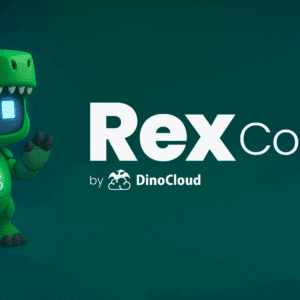
Imagine a world where your business can scale, pivot, and innovate without the shackles of traditional IT constraints. That’s the promise of cloud computing—a realm where cloud solutions chisel new pathways to success every day. As business landscapes evolve at breakneck speeds, cloud technology offers an array of scalable cloud services to keep you ahead of the curve. But it’s not all about agility; it’s about fostering an environment where cloud innovation thrives and where secure cloud computing is a given, not a luxury. By embracing the cloud, you’re not just cutting costs—you’re transforming the very foundation of your business efficiency and resilience.
Key Takeaways
- Understand the transformative power of cloud computing and how it can redefine the efficiency and agility of your business operations
- Explore a variety of scalable cloud services that can be customized to the unique needs of your enterprise
- Learn about the role of cloud innovation in maintaining a competitive edge in today’s fast-paced market
- Discover the importance of secure cloud computing in safeguarding your business data and assets
- Gather insights on how cloud technology is revolutionizing the IT landscape, rendering traditional infrastructure models obsolete
The Evolution and Impact of Cloud Technology
As the digital transformation reshapes industries, the evolution of cloud technology is a driving force behind this change. Gone are the days when IT infrastructure was entirely dependent on physical data centers. Instead, cloud deployment models have established new paradigms for virtualization and efficiency. Whether you’re a startup or an established enterprise, embracing cloud services is no longer an option, but a necessity for staying competitive.
Virtualization technologies are at the heart of cloud-based solutions, enabling multiple virtual environments to coexist on a single physical hardware system. This not only optimizes resource utilization but also cuts down on costs significantly. Moreover, automation in cloud infrastructures empowers your business with the agility to deploy resources rapidly and manage IT operations with unprecedented efficiency.
- Infrastructure as a Service (IaaS): Offers the fundamental building blocks for cloud IT and provides networks, virtual servers, and data storage space.
- Platform as a Service (PaaS): Delivers a framework for developers that they can build upon and use to create customized applications.
- Software as a Service (SaaS): Delivers software applications over the internet, on demand, and typically on a subscription basis.
Each of these service models contributes to a robust cloud providers market, where service is tailored to meet the varied demands of digital business ecosystems. The result is a sleek, utilitarian approach to computing – akin to public utilities – turning on-demand cloud services into a fundamental resource for advancement.
| Service Type | Primary Benefit | Common Providers |
|---|---|---|
| IaaS | Flexibility and control over IT resources | Amazon Web Services (AWS), Microsoft Azure |
| PaaS | Streamlined application development | Google App Engine, IBM Cloud Foundry |
| SaaS | Accessibility and scalability for end-user applications | Salesforce, Oracle Cloud |
In conclusion, your journey to the cloud, supported by the right selection of cloud services and deployment models, is pivotal. It not only shapes your present IT infrastructure but also sets the cornerstone for future innovations and sustainable business growth amidst the ongoing waves of the digital era.
Understanding Different Cloud Models: Public, Private, and Hybrid
As you navigate the sea of cloud computing options available today, it’s essential to understand the core distinctions between the cloud models that shape the services and solutions provided by the industry. Each cloud model—public, private, and hybrid—offers unique features and value propositions that cater to various business needs and objectives. Let’s delve deeper into the characteristics and strategic benefits of these models.
The Distinctive Features of Public Cloud Services
When we talk about the public cloud, we refer to the powerhouse of cloud computing where resources like storage and computation are delivered via the internet by providers like Microsoft Azure and Google Cloud Platform. These cloud service providers grant on-demand services and versatile cloud resources that bolster your business’s scalability and efficiency. With the public cloud’s vast network of global data centers, it stands as an optimal cloud solution for enterprises looking to enhance flexibility with reduced latency.
Benefits and Use-Cases of Private Cloud Environments
For those of you who prioritize enhanced security and controlled access, the private cloud is a sanctuary. Custom tailored to fit your business needs, a private cloud can either be an extension of your onsite infrastructure or hosted remotely. This environment ensures that dedicated cloud resources are confined within a proprietary network, offering a shielded fortress for mission-critical operations and responsiveness to stringent regulatory compliance demands.
How Hybrid Cloud Strategies Enhance Business Flexibility
Embracing the hybrid cloud model presents an alluring dance of adaptability and security by integrating both public and private clouds. The flexible cloud strategies and public-private cloud integration foster a dynamic IT ecosystem that empowers business agility. This architecture allows you to securely manage core processes in a private domain while taking advantage of the scalable, on-demand capabilities of the public cloud for ancillary services, giving you the leverage to pivot swiftly in an ever-changing market landscape.
| Cloud Model | Key Advantages | Best Suited For |
|---|---|---|
| Public Cloud | Scalability, Cost-Effectiveness, Global Reach | Startups, SMEs, Projects requiring vast scaling |
| Private Cloud | Security, Customization, Regulatory Compliance | Healthcare, Finance, Government Entities |
| Hybrid Cloud | Flexibility, Business Agility, Balanced Control | Enterprises requiring agility with sensitive data |
By assessing these cloud models, you can strategically align your IT infrastructure with your business objectives and operational requirements, ensuring you choose the optimal cloud solution to propel your enterprise forward in this digital era.
The Role of Managed Cloud Services in Modern Business
As you navigate the complexities of today’s digital landscape, managed cloud services have emerged as a cornerstone for businesses seeking to enhance their IT operations. Renowned cloud management providers like Accenture and Capgemini are at the forefront, offering a spectrum of services that promote optimized IT operations, including seamless integration and proactive monitoring. These are not mere luxuries; they’re essential for ensuring that your business stays agile and resilient.
Take cloud migration, for example. It’s a crucial step for firms looking to tap into the vast potentials of the cloud. However, the process is replete with intricate challenges that can overwhelm in-house IT teams. This is where managed cloud services come to the rescue. They provide expert guidance every step of the way, ensuring a smooth transition while maintaining cloud scalability and cloud security.
It’s clear that such services have a substantial impact on cost-efficiency. The scalability afforded by managed cloud services translates into a pay-per-use model that allows you to adapt swiftly to fluctuating demands, without over-committing financially. It’s the kind of flexibility that could redefine your business’s operational economics, pivoting from CapEx to OpEx and freeing up capital to fuel growth.
- Disaster recovery planning? Check.
- Automated backups and redundancy for business continuity? Absolutely.
- Scalability to adapt to market conditions on-the-fly? You’ve got it.
However, it’s not all sunshine and rainbows. A few clouds—figuratively speaking—linger on the horizon. Concerns such as data security, potential vendor lock-in, and navigating the complexities of compliance are real issues that you must address. This emphasizes the necessity to handpick cloud management providers that align with your company’s growth trajectory and uphold rigorous standards for safety and reliability.
In short, managed cloud services aren’t just a luxury—they’re an indispensable asset that can define the future success of your business. So, as you ponder over optimizing your operations and maximizing the potential of the cloud, think of it as entrusting the digital backbone of your company to experts who can not only safeguard but also scale and strategize for the future.
AWS Cloud
Embarking on a digital transformation journey with Amazon Web Services (AWS) places cutting-edge technology at your fingertips. AWS Cloud is more than just a cloud service provider; it’s an enabler of business innovation and growth. By leveraging AWS scalability and AWS security, your enterprise can achieve efficient resource utilization across the board. To give you a clearer perspective on how AWS Cloud shapes the robust needs of businesses, let’s explore its myriad benefits.
Benefits of AWS Cloud
AWS Cloud is synonymous with dynamic service offerings designed to cater to the diverse and demanding business landscape. Among these offerings, AWS Elastic Beanstalk emerges as a beacon of developer efficiency, streamlining the deployment and management of applications. Amazon Web Services excel in three critical areas:
- Scalability – AWS infrastructure easily scales to accommodate your growing data needs, ensuring you pay only for the resources you use.
- Security – With AWS security measures, rest easy knowing your data is protected with layers of encryption and advanced compliance frameworks.
- Efficiency – Implement and execute projects with speed, using AWS Cloud’s vast array of services and tools for efficient resource utilization.
Consider the following table, which showcases how AWS Cloud stands out within its service offerings:
| Service Aspect | Benefit | Relation to AWS Feature |
|---|---|---|
| Deployment | Automatic deployment minimizes developer workload | AWS Elastic Beanstalk |
| Scalability | On-demand resource availability aids in seamless scaling | Amazon EC2 Autoscaling |
| Storage | Durable and secure data storage options | Amazon S3 |
| Computing | Flexible computing power to match application needs | Amazon EC2 |
| Security | Comprehensive security and compliance control | AWS Identity and Access Management (IAM) |
| Cost-Efficiency | Pay-as-you-go pricing structure reduces upfront costs | Flexible Pricing Models |
By integrating Amazon Web Services into your business model, you tap into a world-class ecosystem known for its AWS scalability, AWS security, and efficient resource utilization. Tools like AWS Elastic Beanstalk amplify operational efficiency, offering a streamlined approach to application management, making AWS Cloud an indispensable part of accelerating business objectives in the cloud era.
Conclusion
The advent of cloud computing has indelibly marked a new era in the realm of technology and business. It’s a transformation that goes beyond mere digital upgrades; it embodies a full-scale operational revolution. You’ve seen, throughout our exploration, how cloud solutions breed scalability, cost savings, and ineffable efficiency. By diving into the world of cloud models—public, private, and hybrid—you’re now versed in the nuanced strategies that can be customized to fit your organization’s unique needs.
Leveraging the proficiency of managed cloud services ensures your journey towards IT cost optimization is without the headache of constant oversight. Look no further than the breadth of services offered by industry leaders like Amazon Web Services to appreciate how swiftly and securely your resources can scale, all the while ensuring stringent data security and compliance measures are met. With cloud migration strategies becoming more sophisticated and accessible, companies are poised to navigate the transformation with confidence and agility.
As you continue to integrate these pioneering cloud services into your operations, remember the significance of aligning your cloud endeavors with your core business objectives. Doing so not only amplifies the returns on your investment in cloud technology but also paves the road for sustainable growth, innovation, and long-term achievement. The focus moving forward is clear: strategic cloud service integration is not just an option; it’s an imperative for success in today’s digital age.
Gain a deeper understanding of how AWS powers cloud solutions by exploring our article dedicated to AWS Cloud Computing here.
FAQ
What is cloud computing and how does it work?
Cloud computing is the delivery of a range of services over the internet, including servers, storage, databases, networking, analytics, and intelligence. Instead of owning and maintaining physical servers and datacenters, you can access technology services, such as computing power and storage, on an as-needed basis from a cloud provider like Microsoft Azure, Google Cloud Platform, or Amazon Web Services (AWS).
How has cloud technology evolved over the years?
Cloud technology has evolved from traditional data center-based IT infrastructure to virtualized and flexible cloud-based solutions. It leverages virtualization technologies to create multiple virtual instances on a single physical server, improving resource utilization, and features automation for quicker allocation of resources. This has led to the development of various cloud services and deployment models that accommodate different business needs.
What are the main differences between public cloud, private cloud, and hybrid cloud models?
Public cloud services are provided by third-party providers over the internet on a pay-as-you-go basis, offering scalable, elastic resources, and a global reach. Private clouds are exclusive to one organization, providing enhanced security and control, and can be hosted on-site or by a third-party provider. Hybrid clouds combine the functionalities of both public and private clouds, allowing data and applications to be shared between them, and offering a balance of control, flexibility, and scalability.
What are the benefits of AWS Cloud?
AWS Cloud offers a broad spectrum of scalable and secure cloud services. Users benefit from the extensive AWS global network, cost-effective resource allocation, and a suite of tools for developing, deploying, and managing applications. AWS is known for its flexibility, performance, and comprehensive offerings, which include compute, storage, and database services.
What should be considered when undertaking cloud migration?
When undertaking cloud migration, it’s important to consider the compatibility of your current systems with cloud services, the scope of the resources needed, the costs involved, data security and compliance requirements, the expertise of the potential cloud providers, and the strategic business outcomes expected from moving to the cloud.
LinkedIn: https://www.linkedin.com/company/dinocloud
Twitter: https://twitter.com/dinocloud_
Instagram: @dinocloud_
Youtube: https://www.youtube.com/c/DinoCloudConsulting



